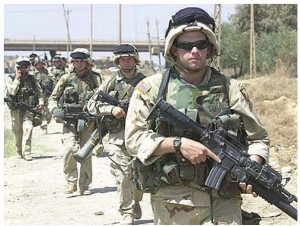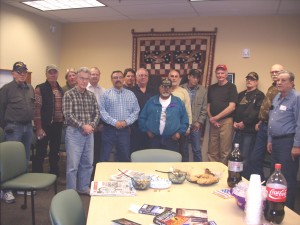May
4
Out of the Darkness
Filed Under Combat PTSD, Life, PTSD, PTSD treatment, Tears of a Warrior, Treating PTSD | Comments Off on Out of the Darkness
by Janet J. Seahorn

“Out of the Darkness, into the Light”. These short seven words explain unmistakably the effects of healing the wounds of PTSD. While reading my daily inspirational “quotes”, I came across this one. We see and hear it often in religious sermons. For the many whose lives have been relentlessly challenged by life’s experiences and survived only by the grace of a higher power or some special intervention, we have an intimate understanding of going from darkness to light.
Sometimes we may reflect on how exactly we got to a “lighter” place: lighter by the brilliance of radiance in our days, lighter in our spirits that carry a heavy burden, unseen, unfelt, and often times misunderstood, and lighter in our physical bodies that endured the trauma from our past.
The answer to how we got to the light may not be as important as the blessing, we are here. In reality, we don’t remain in this space of lightness every moment. Yet, when we experience these twinkles of happiness, we feel a profound sense of peace. A peace that lets us know we are not alone in our battles. A peace that validates we are loved and cared for during our conflicts. A peace that leaves us with the hope that when we are thrown back into the abyss, we CAN and WILL be able to climb back up to the light. Just trusting this inner knowing is what gets us through the dark days and nights. It is what enables us to wake each morning with new expectations for the day. Without such trust it would be impossible to continue the journey, for the path is too unpredictable.
Healing Post-Traumatic Stress Disorder is built on the trust that through inner strength and outer resources we can not only survive and mend, we can thrive. Trauma can cause immense changes in our brains and bodies. It is not merely a matter of ‘sucking it up’ that will move us toward better physical and emotional health; it is taking action to get that help needed for healing. For most physical illnesses this is obvious. If one has a life-threatening disease, he/she would get outside, professional help. She would endure the devastating effects of chemo and radiation to survive. He would go through open heart surgery to repair the damaged organ expecting months of rehabilitation and physical therapy. However, with emotional trauma, some in society still seem to attach a stigma. The only weapon for dissolving the stigma is knowledge. And the only way knowledge blossoms is through openness, education, and courage.
You see it will take each of us to continue to share our insights with others. Truthfully, it is far easier to remain silent, hiding our wounds from the eyes of world. Yet, knowledge does not grow in such darkness. It requires light, nourishment, and valor. So it is up to each of us to contribute to the understanding of PTSD and how one can move “out of the darkness, into the light.”
Blessings and continue mending.
Apr
23
Dog—–God
Filed Under Combat PTSD, Dogs, Pets, Tears of a Warrior, Treating PTSD | Comments Off on Dog—–God
by Janet J. Seahorn

Look into the face of your loving four-legged pet, and I would bet you would see the eyes of GOD. A being so unconditionally loving and faithful, that nothing or no one could keep it from being near our sides. We have written several times about the value of pets. For someone living with Posttraumatic Stress or a serious Traumatic Brain Injury, pets can offer a sense of comfort and well-being that are beyond modern medications; and the side effects are far more positive.
We get many comments and videos from our readers testifying to the upbeat effects their pets have had on them. This week a friend sent us a one we had not seen before. We thought many of you would enjoy viewing this short and touching piece. We also included another written story that has appeared over the internet on many occasions. More than likely, most of you have read it, but every time I see it, and am tempted to delete without reading… something pulls me to the picture and I begin viewing it once more, ending always with tear filled Kleenexes.
You see, this last piece is a true chronicle of what many of our service people and their loving pets sacrifice for our country. Not everyone understands that pets pay a high price for their masters’ deployment. Yet, they do, silently, patiently waiting for that one special person to return. There is no greater joy than the homecoming of a beloved member of a family.
So here is to DOG and to GOD: D = Devotion; O = Omnipresent; G = Goodness/Gift; in any order it means the same thing.
Apr
14
Here Today and Sometimes Still Here Tomorrow
Filed Under Combat PTSD, PTSD, Tears of a Warrior, Today's War, War | 1 Comment

PTSD continues to be everywhere in the news, on TV, and in the movies. The question I have is “Who is listening to all of these stories? Who is concerned about the growing number of new cases resulting from multiple tours of duty in our current wars? Are those in Washington who must attend to severe budget concerns able to do what is necessary? What is right? Is the average American informed enough to care?” Following is information from just one of many data sources on PTSD. It comes from Noel Brinkerhoff (Monday, April 12, 2010), and the information is disturbing.
Nearly 300,000 American troops have served three, four or more times in Iraq and/or Afghanistan, while cases of post-traumatic stress disorder (PTSD) have risen dramatically since the wars began. The possible correlation between these two facts has led to the question of whether it’s fair to send young men and women back into combat again and again, and risk causing long-term mental and emotional problems, not to mention the physical toll.
One U.S. Army study from 2009 found troops in Afghanistan were more vulnerable to developing psychological problems as the number of tours went up (31% for three tours, more than double the rate of those with just one). Another study focused on Iraq showed nearly 15% of Army troops who served two tours suffered from depression, anxiety or traumatic stress; more than double that of a single tour. The PTSD rate was almost 2.5 times higher for two deployments compared with one.
“We just don’t know whether it’s combat exposure, repeated separation from the family or (not enough) time off,” Lieutenant Colonel Paul Bliese, director of the division of psychiatry and neuroscience at the Walter Reed Army Institute of Research, told the Associated Press. “All of those are reasonable explanations.”
Whatever the reason, the ultimate result is that more troops returning home are bringing back with them a whole host of demons and ghosts. These unwanted visitors may never leave the veteran and have significant impact on families, children, and communities. Let us hope that people who can make war decisions are listening, creating effective support services, and making the process as uncomplicated as possible. Let us hope that Americans are willing to provide the physical and mental health funding needed to restore those suffering from combat wounds.
For many families and veterans, the process of getting help becomes so overwhelming difficult that they feel victimized by the very system that should be offering them hope and healing. And let us hope that every politician and every member of our society takes seriously our motto:
If we send them, then we must mend them.
Apr
6
Happy Easter
Filed Under Combat PTSD, Easter, Family, PTSD, Tears of a Warrior | Comments Off on Happy Easter

In our family, Easter is a time to gather and celebrate the Good News. Our last blog focused on the challenges often associated with holidays along with some suggestions for making the day less stressful.
We are happy to report that our Easter celebration was wonderful. We had our sons, several of their friends, Jan’s sister, and two extra dogs for the afternoon. At times it could have been a bit hectic, however by following some of our own suggestions the day went quite well.
As the day went on, Tony made his choices based on how he was feeling and what he wanted to do at the time. Since there were a few basketball games on TV as well as a good movie, he had some quiet time in our lower family room. Most of the guests remained upstairs where goodies were arranged for munching and chatting.
Since the weather was warm with plenty of sunshine, after dinner everyone took a long walk, working off some calories and getting the four-legged visitors out for some exercise. Just being outside in the open air was very therapeutic. It is amazing how calming nature can be in normalizing an otherwise busy gathering.
The evening ended with playing our traditional family games which can be quite loud and annoying for some. So Tony once again spent some quiet time reading and watching March Madness.
What is important is that everyone had a good time, had plentiful opportunities to engage in a variety of activities, and made choices that were appropriate for each person. Long ago we stopped apologizing for any person who decides to make an alternative choice for the day. Each person is responsible for him/herself and each person has permission to do what is best for him/her anytime during the celebrations. By reducing unnecessary expectations, the large gatherings go much smoother.
We are so blessed to be able to spend quality time with family and friends. It is important, therefore, that these special occasions turn out to be special because of the good things that occur, instead of some outburst that will be remembered miserably.
Congratulations family! We made it perfectly through another holiday.
Apr
1
Hippity, Hoppity and Snotty Vets
Filed Under Combat PTSD, Easter, Events, PTSD, Tears of a Warrior | Comments Off on Hippity, Hoppity and Snotty Vets
-by Janet J. Seahorn

Gosh, can you believe it is Easter/Passover and once again families gather to celebrate the spirit of the season. Many will also hunt Easter eggs, gorge on chocolate bunnies, and enjoy family dinner and getting together. This is a time to rejoice, but can also be a time of turmoil. There is ample opportunity for our Snotty Vets to practice breathing, self-control, and “looking” cheerful – even if it’s only a facade. Today I woke with the children’s rhyme of “Here Comes Peter Cotton Tale”, but instead of the regular words this is what came to mind:
Here comes Peter Cotton Tail
Hopping down the combat trail,
Hippity, Hoppity, Demons on the way.
Yikes! How weird is that! Yet, the reality is many people who have suffered severe trauma find holidays incredibly challenging. When everyone around appears to be laughing, enjoying company, having a great time, for some with experiences of trauma, all this joy may simply exacerbate the feeling of depression and isolation. You desperately want to join in the festivities and you desperately want to feel normal. So the downward spiral continues.
Last blog I wrote about Snotty Fish and Snotty Vets. In reflection I remembered past family gatherings where my Snotty Vet tried anxiously to fit into the interactions. He participated gallantly until it got to be too much, which is when the teapot began to spout. Too much steam building in a confined container and something has to give. If only we had known about PTSD, its effects and ways of coping, family gatherings could have been much saner and safer for everyone.
Therefore, here are a few suggestions that have worked for us. We discovered these over many years of observing roller-coaster emotions.
- Don’t try and force your Snotty Vet to participate more than he/she is able.
- Allow them to swim in whatever pond helps them to feel safe and calm.
- Plan the loud festivities that can be annoying for many – not just Snotty Vets – to be in places that are outside or in very large surroundings. By being smart, it reduces the tension and permits everyone a chance to find areas that aren’t so irritating.
- Be thoughtful about the length of time anyone has to spend taking part in the activities.
- Be sure to find a good balance in how you celebrate. Be reflective and enjoy some quiet time as well.
Oh, and be sure to have a Happy Easter/Passover. Celebrations are still important to cherish. They can be the occasions that help us bond more tightly and even heal a bit.
And be sure to be kind to bunnies that wear combat boots.
Mar
24
SNOTTY FISH AND PTSD
Filed Under Life, Love, PTSD, Trauma, War | Comments Off on SNOTTY FISH AND PTSD
by Janet J. Seahorn
 This weekend I heard an experienced angler talk about the joys of being in a stream or lake fishing for Snotty Fish. Snotty Fish, he thoughtfully explained, were those fish that were not easy to catch. They were fish that could not be tricked by some ordinary fly or enticing lure. More than likely, such fish had, in some earlier time, been caught before and managed to escape through sheer luck, tenacity, or down right determination. After going through such a traumatic encounter, they were more cautious than most of their finned friends. They understood the consequences of impulsively taking the enticing lure. Therefore, the fisherman who caught (and released) such a Snotty Fish had to be incredibly patient, knowledgeable, and persistent. This particular angler made it clear that catching Snotty Fish was the best and most rewarding way to angle.
This weekend I heard an experienced angler talk about the joys of being in a stream or lake fishing for Snotty Fish. Snotty Fish, he thoughtfully explained, were those fish that were not easy to catch. They were fish that could not be tricked by some ordinary fly or enticing lure. More than likely, such fish had, in some earlier time, been caught before and managed to escape through sheer luck, tenacity, or down right determination. After going through such a traumatic encounter, they were more cautious than most of their finned friends. They understood the consequences of impulsively taking the enticing lure. Therefore, the fisherman who caught (and released) such a Snotty Fish had to be incredibly patient, knowledgeable, and persistent. This particular angler made it clear that catching Snotty Fish was the best and most rewarding way to angle.
Listening to this person talk, I began to comparing how similar Snotty Fish were to veterans who are living with Post-Traumatic Stress. Many of our troops have experienced the traumas of combat. Men and women who have seen and participated in some of humanities worst deeds; deeds that stay etched on the mind and heart. Vets, who when they return to the mainstreams of society, may be unable to trust others, their governments, and even themselves. Yep, Snotty Vets!
Snotty Vets, like Snotty Fish, are often hard to play out. They have experienced lessons in life that few of their fellow countrymen have ever imagined. Such knowledge often makes them wary of their surroundings, including trusting in their own abilities and worthiness. For family and friends, this knowledge can make these Snotty Vets difficult to live with and understand.
Yet, here is the beauty of being in streams with Snotty Vets—they are worth the time and effort to catch and reel back to wellbeing. Health care professionals recognize this fact. Families, friends and communities who walk the path through appropriate support, timely information and love come to empathize with the journey and value the internal strength, courage, and effort that each of them must live out in order to heal.
So you see, Snotty Vets like Snotty Fish are well worth such effort. Simply swimming in their waters help us have greater gratitude for their sacrifice.
Here’s a toast to all of you Snotty Vets, and to all the spouses, children, and siblings of Snotty Vets: “May your new streams be filled with an abundance of peace, joy, and good vigor. May your days bring you fulfillment, and your nights quiet rest. And may you continue to embrace your Snotty strength and leave behind the sorrows of the battlefield. For you are our precious Snotty Vets. We love you. We honor you. And, most of all, we need you to become whole again.”
Mar
22
What’s Worth Fighting For
Filed Under American Patriotism, Life, War | Comments Off on What’s Worth Fighting For
by Janet J. Seahorn
 Some people may have a difficult time understanding what in this world would be worth giving one’s life. The courage to go into battle knowing the possibilities. Watching while others die or are severely wounded, and still continue to fight. Many poets and philosophers have written how significant it is to live life for something beyond oneself. To live for a cause greater than yourself. This short video was sent to me by my brother. While I listened to the music and watched the screen, it was abundantly obvious why America is definitely worth fighting for. Beyond any political agenda, beyond any religious belief, beyond the love of family and friends, America has given us bountiful blessings with such amazing beauty. Yes, America is not only beautiful; it is worth living and dying for in our lifetime.
Some people may have a difficult time understanding what in this world would be worth giving one’s life. The courage to go into battle knowing the possibilities. Watching while others die or are severely wounded, and still continue to fight. Many poets and philosophers have written how significant it is to live life for something beyond oneself. To live for a cause greater than yourself. This short video was sent to me by my brother. While I listened to the music and watched the screen, it was abundantly obvious why America is definitely worth fighting for. Beyond any political agenda, beyond any religious belief, beyond the love of family and friends, America has given us bountiful blessings with such amazing beauty. Yes, America is not only beautiful; it is worth living and dying for in our lifetime.
http://sagebrushpatriot.com/america.htm
Mar
9
 by Janet J. Seahorn
by Janet J. Seahorn
Some days life is a real challenge. It tests us in many ways. Ways to be smarter. Ways to be braver. Ways to be more thoughtful. Ways to be kinder and more compassionate. And some days, ways to just keep getting up every morning, breathing through each minute and making it through some dark and lonely nights. Living with Post-Traumatic Stress compounds all of these “tests”. At times it may even seem that the journey is too long or too brutal; that the suffering is unending and the battle unachievable. It is during such times that we must remember we are not alone in our ordeals. Reminding that someone, something (for me it is my faith) is walking beside us telling us quietly that we will be OK. Urging us, “Don’t Quit”. We do not know what tomorrow may bring. But if we Don’t Quit, I do believe in the appearance of a brighter, happier day. Believe you have what it takes to pass any test. And whatever comes your way —Don’t Quit!
Don’t Quit |
|
|
Anonymous |
|
|
|
|
|
Mar
2
Honoring Warriors
Filed Under American Patriotism, Events, PTSD, Quilts of Valor | 1 Comment

Veterans
by Janet Seahorn
At first it appeared to be an ordinary Thursday evening in mid-February. The soldiers of battles-past gathered at the new Fort Collins Vet Center for their weekly group meeting with the professional VA Staff.
They draw together to heal wounds that occurred long ago in a land far from home. Wounds acquired from serving in Vietnam – a war where few were honored for their personal sacrifice for their country. The veterans meet to try and understand why their scars linger and are still so painful after so many years. And they meet to try and find a sense of recognition of what each has experienced in life – both past and present.
It was on this night that several Fort Collins community members presented a “Quilt of Valor” to those warriors who gave much and were given little in return. Through their generous donations, the community was able to acquire a special hand-made quilt for the presentation.
The quilt was one small way of saying “Thank you for your service and sacrifice”. And, maybe, the quilt would become a symbol of comfort, hope, and honor. This particular comforter was carefully crafted by Donna Roche and the Quilters of Rogers, Arkansas. Her group has assembled and mailed over 700 similar quilts to wounded warriors in hospitals in Iraq, Afghanistan, Germany and the United States. Ms. Roche and her group explain the Quilt of Valor in this manner:
“The Quilt of Valor is our wounded warrior award for service, sacrifice and valor in the line of duty. It is our way of saying “Thank you for your service – you have not been forgotten.” Many caring souls are involved in making the quilts; from contributing quilt blocks, finishing the tops, and integrating each section into the final product. Each special quilt receives a “Quilt of Valor” label thanking the injured warrior for his/her dedication and sacrifice. The label contains the name of those involved in the making of each caring blanket.”
The Quilt of Valor is in fact a symbol of renewal. It transforms the hands of war’s destruction through the caring quilter’s fingers of each blanket’s construction. It shifts the heart from the darkness of combat to the light of a kinder future. And, hopefully it moves the experiences of combat trauma to a quieter sense of peace.
On this Thursday evening, warriors who were never honored finally have their Quilt of Valor. The gratitude in their teary eyes, said it all. Perhaps, after all these years, others do care. Perhaps, there is now a sense of acknowledgement of what these warriors gave without hesitation. You see, it is never too late to say thank you, and the heart is never too old to feel the warmth of such a genuine gesture.
Feb
11

by Janet J. Seahorn
This week is the week of the Heart. Yep, lots of hearts in the multiple shapes and shades of Valentine cards. This is the week — some focus only on one day — to call forth the power of Love. Sounds, corny, but it is true. Love heals.
One only needs to watch a small child with a skinned knee crying for comfort. Mom enfolds the tiny tot in her arms, puts a band aid on the boo boo, kisses it gently, and soothingly says to her child, “See all better”. And the child believes. Wow! If the emotional counselors are correct, what we focus on we get. Perhaps we should try to focus on Love, even for a day. Test the statement, “Love Heals”.
Love Heals acts of war…
Guns, bombs, and torture certainly don’t.
Love Heals violent acts of countless forms.
I may never forget a terrible act, but maybe I can get to a bit of forgiveness.
Love Heals our physical and emotional pain.
Ask a pet owner of the power of his precious companion.
Love heals our fears.
“Worry is simply the habit of focusing on what we don’t want.” (January 22, 2010, Daily Word)
Through the strength of the Heart, Love Heals. And like that small child, I choose to believe.

